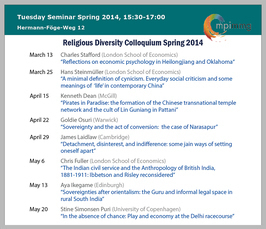"The guru as a wise legislator: the guru and informal legal space in rural South India"
Religious Diversity Colloquium Spring 2014
- Datum: 13.05.2014
- Uhrzeit: 15:30 - 17:00
- Vortragende: Aya Ikegame (Edinburgh)
- After completing her PhD in Social Anthropology at the University of Edinburgh in 2007 (a historical anthropological study of the South Indian kingdom of Mysore) Dr Aya Ikegame won an ESRC postdoctoral fellowship (2007-8). She was then employed as a postdoctoral research fellow on an AHRC/ESRC project on monastery-run schools in South India (2009-10) at Edinburgh University’s Centre for South Asian Studies. She also worked (2010-11) as a Research Fellow at the Centre for Contemporary India Area Studies in the National Museum of Ethnology, Japan. She joined the OECUMENE Project in 2011.
- Ort: MPI-MMG, Hermann-Föge-Weg 12, Göttingen
- Raum: Conference Room

For more details please contact vdvoffice(at)mmg.mpg.de.
The anthropology of sovereignty has provided examples of the various practices of sovereign-performers, or localised sovereigns, which are radically different from the normative understanding of sovereignty. Meanwhile a renewed interest in sovereignty within political theory has exposed several paradoxes. For some, sovereignty is a unifying force for autonomy and self-rule, while for others it is an oppressive power over citizens who demand political freedoms. Some insist upon its absolute and indivisible nature at its core, whilst others suggest that it can be sharable, partial and divisible. This paper, while referring to the paradox in Rousseau‘s theory of popular sovereignty, examines gurus, mostly celibate males, who have become politically influential in the southern Indian state of Karnataka. Backed by their religious institutions called mathas, these individuals are responsible for a variety of welfare enterprises from education to health care. Some even organise courts that arbitrate local and family disputes. This paper thus examines the ways in which rural citizens of central Karnataka constitute gurus as a sovereign in order to enhance their local self-rule.
The popular constitution of a local authority reveals the contingent and contradictory character of the guru as a sovereign who tries to be a disinterested wise legislator encouraging people to rule themselves. The guru as a sovereign appears to embody ‚the general will‘ of the people at the same time as he stands above the community he represents. The idea of renunciation has gained a new meaning here. His ‚social death‘ keeps him beyond the community and simultaneously enables him to create a new tie with every member of the community. The paper explores these themes in the particular context of the functioning of a guru‘s arbitration court in rural south India.